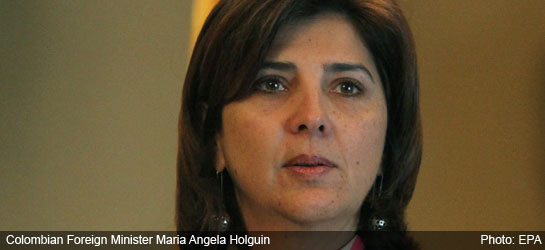
Colombia’s decision to miss the Nobel Peace Prize ceremony illustrates the shortcomings of its foreign policy. The country’s hasty and largely improvised moves to deepen trade links with Asia, and more specifically with China, will not only hinder Colombia’s independence in foreign policy, but also negatively affect the country’s slowly improving international image.
For the past decade Colombia’s foreign policy independence has steadily deteriorated. Uribe’s government focused solely on maintaining a subservient relationship with Washington, but Colombia’s political class felt that these efforts did not translate into more beneficial treatment by the superpower, a view which is corroborated by the still unratified free trade agreement. And most importantly, this policy resulted in the regional isolation of Colombia.
Santos has diversified and improved foreign policy to some extent. The government has broadened its view of international relations to encompass more countries than just the U.S., and Santos, together with his Foreign Minister Maria Angela Holguin, has done an exceptional job in improving diplomatic relations with countries in the region. Chavez has not only stopped his diatribes against the government, but has called Santos his “new best friend.” Ecuador also decided to reciprocate the signals of goodwill by renewing diplomatic ties with Colombia.
Nevertheless, Colombia’s foreign policy towards other regions lacks coherence, especially towards China. The decision to miss the Nobel Peace Prize ceremony illustrates this situation. On December 7, the Nobel Peace Prize committee announced that Colombia was among 18 countries that would abstained from attending the ceremony for Chinese activist Liu Xiaobo in Oslo, Norway, on December 10. Liu is serving an 11-year jail sentence for his essays and a manifesto he helped draft, Charter 08, which demands political reform, human rights guarantees and an independent judicial system. Most of the 18 countries appear to have bowed to economic pressure from China.
Despite the negative international coverage Holguin only explained the decision two days later, on December 9. She argued that Colombia only had one ambassador, Rafael Nieto Navia, dealing with all Scandinavian countries from Stockholm, and since the Peace and Literature ceremonies were to be held three hours and a half apart in Oslo and Stockholm, respectively, Colombia could only be present at one ceremony. The government decided to attend the Literature award because Vargas Llosa was not only Peruvian, but also Santos’ friend. The minister said she had not anticipated the media attention the decision would attract, and that she would send another member of the diplomatic corps to attend the ceremony. But the damage was already done.
If the minister’s response is accepted, it clearly illustrates the government’s shortcomings in dealing with international issues and the incompetence of the diplomatic corps in three ways. First, the international media had been covering the Peace Prize very closely after it emerged on November 4 that China had allegedly sent letters to diplomatic missions in Oslo “advising” them to miss the ceremony. Second, an email I sent on November 21 to the head of the Consular mission in Oslo, first secretary Santiago Salcedo Buitrago, inquiring whether Colombia would attend the ceremony given China’s pressure, went unanswered. Third, the foreign minister could have asked the ambassador in Berlin or in The Hague to attend the ceremony.
If, however, Bogota did intend to boycott the ceremony due to economic pressure from Beijing, it illustrates the government’s largely improvised policy towards China. This improvisation stems from the lead that other countries in the region have in terms of trade with China when compared with Colombia. Nevertheless, it is questionable whether trade ties would have been drastically affected, as China’s trade deals are based mainly on economic rather than political considerations; as long as Colombia’s products, especially commodities, are competitive, China and its companies will be keen to reap the economic benefits.
Moreover, missing the ceremony would have sent negative signals at the national, regional and international levels. At the national level, the decision would have affected Santos’ credibility in terms of the protection of human rights; in the regional sphere, it could have hindered the country’s chance to preside over UNASUR; and at the international level, it would have called into question the reputation of the country before the United Nations Security Council and other organizations and forums.
Santos’ desire to reach the East is commendable, but an improvised policy towards China can only be detrimental. It is imperative that the Colombian Foreign Ministry consolidates its policy towards China, and Asia in general, by employing expert personnel.

